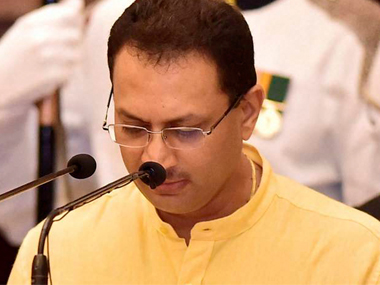Eighteen months before Union Minister Anant Kumar Hegde
created a furore by saying that the Bharatiya Janata Party is here to change the Constitution, rightwing intellectual Ram Bahadur Rai too had echoed the same intent and sentiment in an interview to a media outlet. Speaking to
Outlook magazine on 13 June, 2016, Rai said, “There is a single party majority and all parties are in Parliament. This is the right time to convert the Lok Sabha into a Constituent Assembly.” Rai then stressed, “This Constitution needs to be reconsidered afresh.” Rai is not a freewheeling intellectual. A veteran journalist, he was once the general secretary of the Akhil Bharatiya Vidyarthi Parishad (ABVP). He is currently chairman of the Indira Gandhi National Centre of Arts, a post to which he was appointed by the Narendra Modi government in April 2016. [caption id=“attachment_4279173” align=“alignleft” width=“380”] A file image of Union Minister Anant Kumar Hegde. PTI[/caption] Rai laid out several reasons for reframing the Constitution, including picking holes in its Preamble, which is where the words “secular” and “socialist” were introduced through the 42nd amendment in 1976. The introduction of these two words changed the description of India from “sovereign democratic republic” to a “sovereign socialist secular democratic republic”. It may be recalled that in his address to the Brahman Yuva Parishad in Koppal, Karnataka, Hegde said: “A few people say the Constitution mentions the word secular, so you have to agree. Because it’s there in the Constitution, we will respect it, but this will change in the near future. The Constitution has changed many times before. We are here and have come to change the Constitution. We will change it.” The fact that the Constitution has been changed many times was also the argument Rai cited to advocate turning the current Lok Sabha into a Constituent Assembly. Rai said, “There have been over 100 constitutional amendments; one every year, and we still cannot say there won’t be a need for more. This in itself is proof that the Constitution does not fulfil today’s needs.” Rai was severely critical of the Preamble. He said it wasn’t even discussed in the Constituent Assembly, nor was it part of the Objective Resolutions that Jawaharlal Nehru moved on 13 December, 1946, and the Constituent Assembly adopted on 22 January, 1947. Rai then delivered the knock-out punch: “Whatever is in the Preamble is open for a new Constituent Assembly to do as it pleases.” In other words, the new Constituent Assembly can delete or insert words in the Preamble. Hindutva votaries, as also a few others, have traditionally been opposed to the Preamble mentioning India as a secular republic. Rai did not explain why the Constituent Assembly was debarred from framing a Preamble just because the Objective Resolutions did not mention it. After all, the Preamble’s spirit is very much present in one of the provisions of the Objective Resolutions: “Wherein shall be guaranteed and secured to all the people of India justice, social, economic and political: equality of status, of opportunity, and before the law: freedom of thought, expression, belief, faith, worship, vocation, association and action…”
Rai also thought that the Constitution framed by the Constitutional Assembly became a “new testament to our gulaami (slavery).” This was because the lawyers who framed the Constitution lacked a connection with India’s nature or culture.
The other reason why the Constitution became a testament to “our slavery” was that British India’s last viceroy, Lord Mountbatten, had decided who would frame the Constitution. In the Outlook interview, Rai also questioned Dr BR Ambedkar’s role in framing the Constitution. He said, “Ambedkar’s role was limited… so that whatever material Rau gave him, he would correct its language. It was like RAW or IB, where footsoldiers write reports in broken English and IPS officers turn it into good English, capable of being presented to the prime minister. So, Ambedkar did not write the Constitution.”
When asked specifically whether Ambedkar’s role in drafting the Constitution was a myth, Rai replied, “Yes, myth hai, myth hai, myth hai. It is a part of identity politics.”
It is said to be an article of faith with the Rashtriya Swayamsevak Sangh (RSS) that the Constitution should be reframed. For instance, Atal Bihari Vajpayee, during his tenure as prime minister, appointed former Chief Justice MNR Venkatachaliah as the head of a commission to review the Constitution. But Vajpayee was heading a coalition government – his compulsion was to satisfy the RSS without alienating his allies. Presumably, it is to create “consistency” that Rai underscored the need to look afresh at the Constitution and Hegde went one step further to declare the BJP’s intent to change it. The BJP has since disowned Hegde’s remark. Likewise, it will say that Rai isn’t a member of the BJP and his views are therefore personal. But this is typically the way the Sangh shifts the goalpost – insert a contentious idea into the public discourse, retreat in case there is a hostile reaction, and then reintroduce it with greater vigour to take a step back again, until it becomes a part of the common sense of people.


)
)
)
)
)
)
)
)
)



